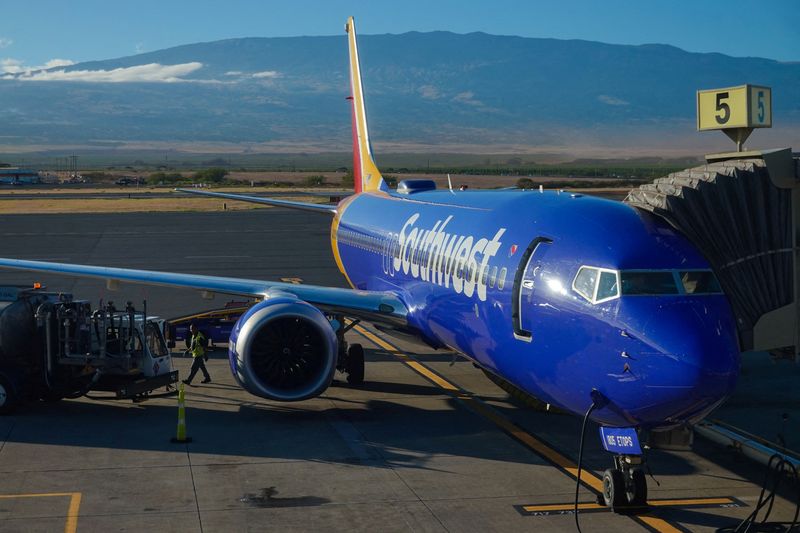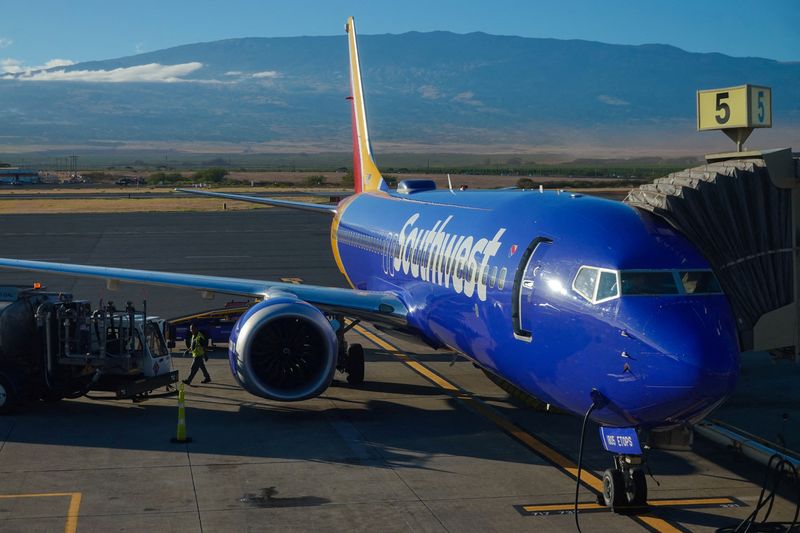Stock Markets
Analysis-Southwest Airlines to end its brand-defining open-seating policy. Will it work?

By Rajesh Kumar Singh
CHICAGO (Reuters) – Southwest Airlines (NYSE:)’ plan to eliminate open seating is one way for the company to raise much-needed revenue, but it comes with the risk of alienating loyal customers.
The unusual practice of letting passengers choose their own seats once they board the plane was created by Southwest’s egalitarian-minded founder, Herb Kelleher, and has been central to the airline’s brand image for more than 50 years.
But the feature is about to end, torpedoed by disappointing earnings and share performance since the pandemic and pressure from activist investor Elliott Management. The Dallas-based airline last week announced it would pivot to assigned seating instead. It plans to share more details at its investor day in September.
The company also plans to offer seats with extra legroom – yet another departure from Kelleher, who disliked dividing airline seating into different classes of service. Southwest said the new cabin layout will require approvals from the U.S. Federal Aviation Administration and is expected to be available for bookings in 2025.
The lack of assigned and extra-legroom seating has been one of the biggest obstacles to Southwest’s ability to attract premium travelers, said Henry Harteveldt, founder of travel consultancy Atmosphere Research Group.
“As a business, you always want to give your customers a reason to pay you more,” he said.
Investors and analysts say the company had little choice but to evolve. Shares have lost nearly half their value in the last three years, during a time when the has gained 25%. The company’s trailing price-to-earnings ratio is above 33, far exceeding the industry median of 4.86, and just two analysts of 18 have a “buy” rating on the stock, according to LSEG data.
Southwest needs new high-margin revenue streams to offset cost pressures and boost profit. Its operating margin declined to 0.2% in the first half of this year from more than 13% in 2019.
Analysts at Raymond James expect the changes to contribute 95 cents a share to the airline’s earnings next year. Rivals such as Delta, United and Alaska Airlines have been relying on big-spending premium travelers to protect their profits.
Last week, Southwest CEO Bob Jordan called the change a “strategic transformation” that could generate more than $1 billion in annual revenue and broaden the airline’s appeal.
Analysts say Southwest’s success hinges upon its ability to market and sell the changes and break in to a market it has never served before.
“Expectations should be tempered that assigned seating is a lightswitch change for Southwest,” said Conor Cunningham, an analyst at Melius Research.
Elliott Investment Management did not see it that way either, dubbing the changes “too little, too late,” reiterating its demand for new leadership. The firm is trying to oust CEO Jordan and board chair Gary Kelly, saying the company needs fresh perspectives.
Last Thursday, Jordan said while the company wanted to hear Elliott’s feedback, the activist investor had not shown willingness to engage in any meaningful conversations.
Southwest considered abandoning open seating and switching to assigned seating in 2006 but dropped the idea after tests showed the move might hurt its efficiency and increase boarding time by 1 to 4 minutes. The switch could also drive up labor costs as Southwest could need more agents for boarding.
How customers will respond is unclear. Jordan said the company surveyed tens of thousands of customers, with many citing its open seating policy as the No. 1 reason for deciding to stop flying with Southwest and choose a rival.
Some travelers wondered if the company would also do away with its policy of no fees for bags. Jordan has said the company has no plans to start charging for bags, adding that the airline’s data shows that a no-bag-fee policy is the No. 1 reason customers choose to fly Southwest.

To some customers, though, the end of open seating is a major blow to the airline’s uniqueness.
“Southwest, I fear you are losing your differentiation with this choice,” Robb Winger, who called himself a Southwest “loyalist,” wrote on LinkedIn.
Stock Markets
Suburban Propane director Logan sells $139k in shares
Stock Markets
Stock market today: S&P 500 closes lower, but posts big weekly win
Stock Markets
TD Bank promotes Laura Nitti to retail market president role

 Forex3 years ago
Forex3 years agoForex Today: the dollar is gaining strength amid gloomy sentiment at the start of the Fed’s week

 Forex3 years ago
Forex3 years agoUnbiased review of Pocket Option broker

 Forex3 years ago
Forex3 years agoDollar to pound sterling exchange rate today: Pound plummeted to its lowest since 1985

 Forex3 years ago
Forex3 years agoHow is the Australian dollar doing today?

 Cryptocurrency3 years ago
Cryptocurrency3 years agoWhat happened in the crypto market – current events today

 World3 years ago
World3 years agoWhy are modern video games an art form?

 Commodities3 years ago
Commodities3 years agoCopper continues to fall in price on expectations of lower demand in China

 Economy3 years ago
Economy3 years agoCrude oil tankers double in price due to EU anti-Russian sanctions































